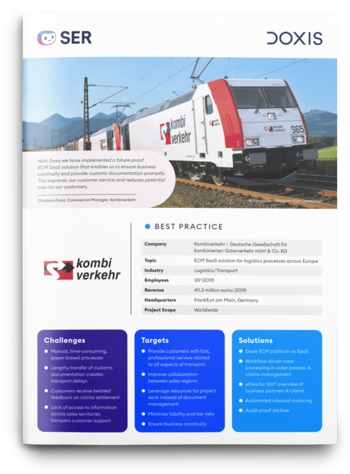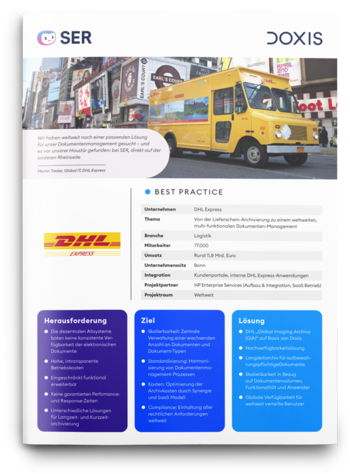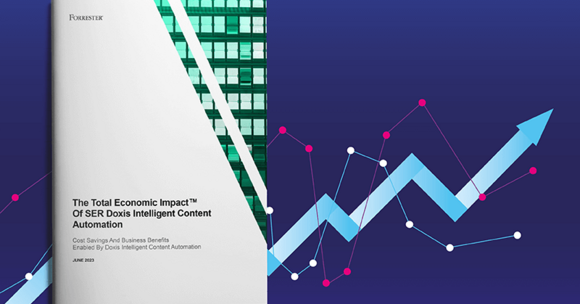SER Blog Innovation & Technology
Digitalization in logistics: 5 challenges and how to overcome them
Victoria McEwan
The logistics industry is undergoing rapid transformation and dealing with a whole host of challenges related to agility, visibility and sustainability. Confronting these challenges along with the need for accelerated digital transformation have become top priorities for logistics companies.
To future-proof and transform operations, logistics and transport businesses need to digitize and more thoroughly automate their operations. They need to offer seamless and well-connected digital solutions so employees can access important information instantly and provide top-quality customer service.
But what if we told you that many of the challenges logistics companies encounter can be solved with reliable and modern enterprise content management (ECM)? In this blog we’ll take you through the challenges, how to solve them and the substantial benefits of overcoming them with the right ECM solution.

Challenge 1: Siloed operations
Challenge: In an increasingly digitized and global marketplace, the demand on logistics supply chains to fulfill orders swiftly and cost-effectively has intensified. But when different teams in different locations are all using different systems, how can you operate quickly and efficiently – especially when information is scattered and not easily found?
Solution: If you dedicate efforts to break down information silos and automate operations, you’ll build enterprise resiliency, which translates into a competitive advantage. By centralizing your data with a modern enterprise content management system that can be accessed by all employees and integrated with your current IT landscape, information siloes are a thing of the past.
What’s more, a modern ECM can find and analyze information, unlocking the key to easy information transfer and collaboration – making information retrieval simple and helping to optimize your logistics operations.
Kombiverkehr, a European logistics leader, improved collaboration between sales regions and provide their customers with faster professional service across all aspects of transport using the ECM platform, Doxis Intelligent Content Automation.
With approx. 900,000 truck shipments per year, invoices with up to 2,000 pages per shipment are generated.
Shipments have to arrive without any delays caused by missing customs documentation, and business partners have to be notified proactively regarding the status of their shipments and any damages. Inbound invoice automation was essential for having transparency across all their invoice processes and was key to staying organized and on track, helping Kombiverhekr automate manual tasks, save time and keep compliant in line with regulations.
“With Doxis we have implemented a future-proof ECM SaaS solution that enables us to ensure business continuity and provide customs documentation promptly. This improves our customer service and reduces potential risks for our customers,” said Christian Franz, Commercial Manager at Kombiverkehr.

kombiverkehr: ECM SaaS solution for logistics processes across Europe
Find out how Kombiverkehr uses Doxsi4 SaaS to ensure business continuity, contactless logistics processes and smooth collaboration with authorities and service teams.
Read nowChallenge 2: Data management and security
Challenge: Information is what powers the logistics industry. Everything we wear, eat, consume and encounter needs to be produced, stored, transported, and purchased. With that in mind just think of the sheer volume of data that logistics companies deal with on a day-to-day basis. Data is the number one commodity in logistics and will be for the foreseeable future.
With trade expansion in the picture, this means dealing with even more data. Storing and accessing this information consequently becomes even more challenging, especially when it’s segmented and stored at different locations.
The sheer scale of data management along with manual data entry and handling leads to mistakes that can hamper the goal of improving customer experiences. A modern enterprise content management solution in supply chain management and logistics is needed so enterprise leaders can adhere to the data management standards, fulfill customer expectations and turn they data into actionable insights to inform future decisions.
Solution: A modern digital ECM solution not only helps you to effectively store and manage your growing archive of data; it can also connect your fragmented data sources to give you a clear overview of what’s happening across your business.
Having a single source of truth gives you a real-time picture of what is happening across your operations and helps enterprise leaders to adhere to data management standards so your business can stay compliant and fulfill customer expectations.
DHL has the world’s largest commercial document archive, powered by Doxis.

DHL Express: The world's largest commercial document archive
Read all about how DHL securely archives billions of documents and makes them available globally 24/7 — with Doxis
Read nowChallenge 3: Lack of process automation
Challenge: Labor-intensive, human-led logistics operations are not only time-consuming, but can also be error-prone and inefficient. To keep up with the rising demands of customers, logistics companies must look into automation solutions to save time, money and resources. With logistics being one of the most paper-intensive industries, automation shouldn’t be an afterthought.
Solution: Logistics businesses should consider AI-powered enterprise content management software to automate tasks and workflows in document-centric processes. As the logistics industry continues to grow, combining the expertise of humans with AI and automation can open doors for logistics professionals to tackle challenges with confidence and improve efficiency.
The power of AI
McKinsey estimates that logistics companies will generate $1.3-$2 trillion per year for the next 20 years in economic value by adopting AI into their processes. What power does AI hold for logistics companies?
- Demand forecasting: AI capabilities enable organizations to gain insights from real-time data which can be used for forecasting and managing customer expectations. AI can be a big helper in improving accuracy helping to optimize planning, manage costs effectively and improve customer satisfaction by making decisions that help meet the demands of customers.
- Supply chain planning: AI helps businesses analyze demand in real-time so that organizations update their supply planning parameters dynamically to optimize supply chain flow. With dynamic supply planning, businesses use fewer resources, which helps to minimize waste.
- Manual tasks: Many businesses still follow manual procedures. In logistics, where there are numerous documents like consignment notes from which structured data needs to be manually extracted, this can be incredibly time- AI can really help with automated end-to-end document processing – streamlining the lifecycle of your documents and significantly reducing the burden on employees.
Combining AI with automation – Intelligent Content Automation
A modern, intuitive ECM system with integrated AI and automation capabilities – known also as Intelligent Content Automation – can fully automate certain tasks like invoice processing through AI-powered solutions.
What exactly does a fully automated, AI-powered inbound invoice process look ?
- Electronic invoices are captured and read as soon as they arrive, no matter the channel or file type.
- Leveraging the latest AI for text recognition, all invoice data is automatically extracted and validated against the order data in your ERP system.
- The next step… verification. Intelligent invoice automation software checks that all the data is correct and flags any missing or incorrect data. If something is incorrect, you can either correct or validate the data. You can also trigger a workflow for the vendor to correct the invoice.
- If the invoice looks good, it gets automatically put into the approval workflow
Experience first-hand the invoice automation process with this walkthrough.
The benefits?
Same-day processing of thousands of invoices, 50% time savings per invoice, and complete transparency and compliance for all your invoice processes.
Learn more about Doxis Intelligent Invoice Automation here.
Challenge 4: Dependency on legacy systems
Challenge: Legacy systems are a huge barrier to progress. Aging systems not only slow down operations, but they are also a huge dampener on productivity and the maintenance can be incredibly costly. To scale without risk, ensure business continuity and future-proof operations, the logistics industry needs to modernize their legacy information management systems.
Now is the time for logistics businesses to embrace next-generation ECM systems that integrate well with the rest of the IT application ecosystem. Many logistics companies have invested in traditional IT systems over the years that have become the norm for operations and integrating new technologies with these systems can be complex and time-consuming.
To make it even harder, legacy systems may not be compatible with some newer technologies, making it difficult to leverage their full potential.
Logistics companies need to embrace technology that can integrate seamlessly with other systems to ensure a smooth transition and enhance business operations.
Solution: An modern ECM system can provide visibility across the business, streamline and simplify cross-team collaboration, and seamlessly integrate with your current systems to connect your data. Modernizing your legacy systems comes with a whole host of advantages:
- Enhanced data security and improved compliance
- Greater flexibility to adapt to industry and circumstantial changes
- Cost savings
- Improved efficiency
- Empowers you to utilize artificial intelligence and automation
- No limits to scaling your business
- Mobile cloud solutions that enable remote work
Want to learn more about modernizing legacy systems? Check out our blog.
Challenge 5: Skilled Labor Shortages
Challenge: Last but certainly not least, the logistics industry also faces a talent shortage challenge. A shortage of skilled workers means that logistics providers need software to handle simple tasks and free up remaining time for demanding work. Software adopted by companies must be intuitive and easy to use for employees across the business.
Solution: Qualtrics data found that employees are 230% more engaged and 85% more likely to stay in their jobs longer than three years if they have the technology tools needed to do their jobs.
Think of how your employees complete their daily tasks currently: Do they have the right tools to help them thrive in their job role and make work easier? As innovative tech fits more seamlessly into our day to day lives, employees will expect the same standards of technology at work and have little desire to work with slow systems with poor functionality and support.
Not having the right tools or using outdated systems makes work clunky and drives away top talent that companies want to attract in the age of digital transformation.
Embracing modern ECM solutions can address all of these challenges faced by logistics firms and are essential for competitive, efficient and seamless operations. Discover more about how an ECM can work for your logistics business here.
The latest digitization trends, laws and guidelines, and helpful tips straight to your inbox: Subscribe to our newsletter.
How can we help you?
+49 (0) 30 498582-0Your message has reached us!
We appreciate your interest and will get back to you shortly.




